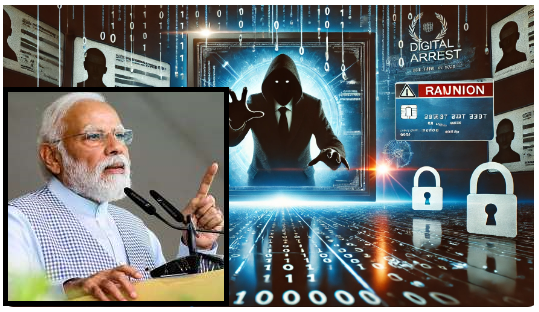
New Delhi, October 27 : Prime Minister Narendra Modi addressed the nation on Sunday through his ‘Mann Ki Baat’ radio program, issuing a strong warning about the growing threat of scams in the name of “digital arrest.” The Prime Minister underscored that “digital arrest” is not a legitimate process under Indian law, calling it a “fraud and deceit” by individuals attempting to exploit unsuspecting citizens. He labeled those involved as “enemies of society.”
In his address, PM Modi explained that “digital arrest” scams have become an emerging trend where fraudsters impersonate officials from national investigative agencies to pressure victims. “Under this fraud, scammers pose as police, CBI, RBI, or narcotics officials and speak with utmost confidence. They create an atmosphere of fear, gaining personal information from victims and ultimately demanding money,” he said. The Prime Minister highlighted that victims of such scams span all age groups and socioeconomic backgrounds, with many losing significant sums of hard-earned money.
PM Modi assured the public that investigative agencies are actively collaborating with state governments to combat these scams. He mentioned that the National Cyber Coordination Centre has been established to strengthen coordination among these agencies, intensifying efforts to track and curb digital fraud.
The Prime Minister also provided practical steps for citizens to protect themselves from falling prey to these scams. “If you receive a call from someone claiming to be an investigator demanding money or personal information, do not be intimidated,” he advised. “Know that no investigative agency conducts such interrogations over the phone or video call. Practice these three steps: stop, think, and act. If possible, take a screenshot and record the conversation. No government agency will threaten or demand money through phone calls.”
With cyber scams on the rise, the Prime Minister’s appeal to the public underscores the importance of awareness and digital vigilance. By remaining alert and following these precautions, citizens can protect themselves from such fraudulent schemes.
Prime Minister Narendra Modi, during his ‘Mann Ki Baat’ address on Sunday, urged educational institutions across India to play an active role in raising awareness about cyber scams. Emphasizing the critical need for collective action to combat rising cyber fraud, he encouraged schools and colleges to involve students in the campaign against cyber scams, describing them as a growing threat to society.
“We can only fight this challenge through collective efforts in society,” PM Modi stated, adding that educating young people about cyber safety can empower them to recognize and avoid digital fraud. By including students in awareness programs, he believes they can become a formidable line of defense against scammers and aid in spreading critical knowledge to their families and communities.
This call to action aligns with the government’s broader effort to strengthen digital security and protect citizens from exploitation in an increasingly digital world.
What is Digital Arrest ?
“Digital Arrest” is a fraudulent tactic where scammers impersonate law enforcement or government officials to coerce victims into providing sensitive personal information or making financial payments. Here’s how it typically unfolds:
1.Impersonation of Authorities: Scammers pretend to be officials from agencies like the police, CBI, RBI, or even narcotics departments. They may claim to be contacting the victim on official business, giving an impression of urgency and authority.
2.Creating Fear and Urgency: The scammers often assert that the victim is under investigation for a crime or has legal issues. They may use legal jargon and false accusations to create an atmosphere of fear. This intimidation tactic is intended to disorient the victim and prevent them from questioning the call’s legitimacy.
3.Demand for Personal Information and Money: After scaring the victim, the scammers typically request personal information (like bank details, identification numbers, or even passwords) under the pretense that it’s needed for verification or to “clear their record.” They may also demand immediate payments, claiming these are necessary to avoid arrest, fines, or further legal action.
4.Exploiting Trust and Quick Decisions: The scammers press for quick compliance, stating that delays will worsen consequences. They prey on the victim’s trust in law enforcement and their fear of repercussions, often convincing them to hand over money or sensitive data.
The”Digital Arrest” scam is especially deceptive because it exploits people’s respect for authority and the fear of legal trouble. To prevent falling victim to these scams, experts advise skepticism towards unsolicited calls from people claiming to be officials, particularly those asking for payments or personal information.





